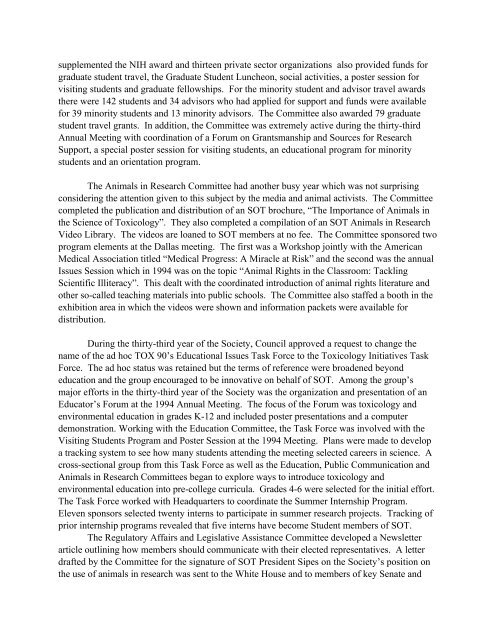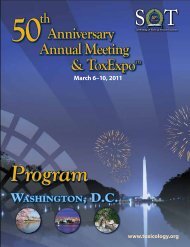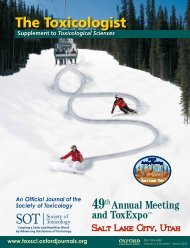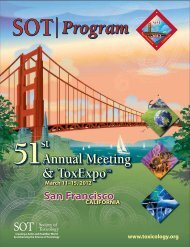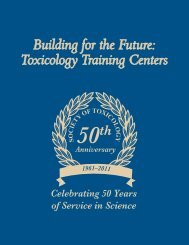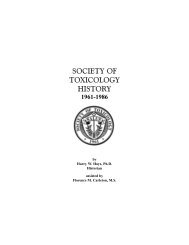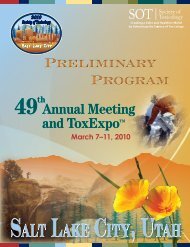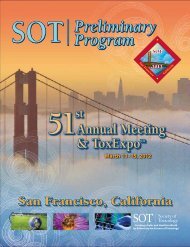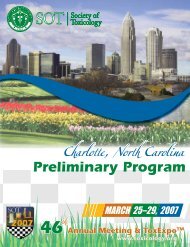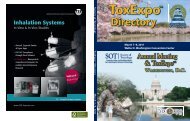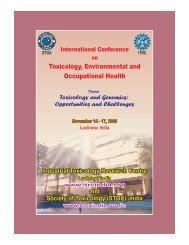SOCIETY O. TOXICOLOGY HISTORY - Society of Toxicology
SOCIETY O. TOXICOLOGY HISTORY - Society of Toxicology
SOCIETY O. TOXICOLOGY HISTORY - Society of Toxicology
You also want an ePaper? Increase the reach of your titles
YUMPU automatically turns print PDFs into web optimized ePapers that Google loves.
supplemented the NIH award and thirteen private sector organizations also provided funds for<br />
graduate student travel, the Graduate Student Luncheon, social activities, a poster session for<br />
visiting students and graduate fellowships. For the minority student and advisor travel awards<br />
there were 142 students and 34 advisors who had applied for support and funds were available<br />
for 39 minority students and 13 minority advisors. The Committee also awarded 79 graduate<br />
student travel grants. In addition, the Committee was extremely active during the thirty-third<br />
Annual Meeting with coordination <strong>of</strong> a Forum on Grantsmanship and Sources for Research<br />
Support, a special poster session for visiting students, an educational program for minority<br />
students and an orientation program.<br />
The Animals in Research Committee had another busy year which was not surprising<br />
considering the attention given to this subject by the media and animal activists. The Committee<br />
completed the publication and distribution <strong>of</strong> an SOT brochure, “The Importance <strong>of</strong> Animals in<br />
the Science <strong>of</strong> <strong>Toxicology</strong>”. They also completed a compilation <strong>of</strong> an SOT Animals in Research<br />
Video Library. The videos are loaned to SOT members at no fee. The Committee sponsored two<br />
program elements at the Dallas meeting. The first was a Workshop jointly with the American<br />
Medical Association titled “Medical Progress: A Miracle at Risk” and the second was the annual<br />
Issues Session which in 1994 was on the topic “Animal Rights in the Classroom: Tackling<br />
Scientific Illiteracy”. This dealt with the coordinated introduction <strong>of</strong> animal rights literature and<br />
other so-called teaching materials into public schools. The Committee also staffed a booth in the<br />
exhibition area in which the videos were shown and information packets were available for<br />
distribution.<br />
During the thirty-third year <strong>of</strong> the <strong>Society</strong>, Council approved a request to change the<br />
name <strong>of</strong> the ad hoc TOX 90’s Educational Issues Task Force to the <strong>Toxicology</strong> Initiatives Task<br />
Force. The ad hoc status was retained but the terms <strong>of</strong> reference were broadened beyond<br />
education and the group encouraged to be innovative on behalf <strong>of</strong> SOT. Among the group’s<br />
major efforts in the thirty-third year <strong>of</strong> the <strong>Society</strong> was the organization and presentation <strong>of</strong> an<br />
Educator’s Forum at the 1994 Annual Meeting. The focus <strong>of</strong> the Forum was toxicology and<br />
environmental education in grades K-12 and included poster presentations and a computer<br />
demonstration. Working with the Education Committee, the Task Force was involved with the<br />
Visiting Students Program and Poster Session at the 1994 Meeting. Plans were made to develop<br />
a tracking system to see how many students attending the meeting selected careers in science. A<br />
cross-sectional group from this Task Force as well as the Education, Public Communication and<br />
Animals in Research Committees began to explore ways to introduce toxicology and<br />
environmental education into pre-college curricula. Grades 4-6 were selected for the initial effort.<br />
The Task Force worked with Headquarters to coordinate the Summer Internship Program.<br />
Eleven sponsors selected twenty interns to participate in summer research projects. Tracking <strong>of</strong><br />
prior internship programs revealed that five interns have become Student members <strong>of</strong> SOT.<br />
The Regulatory Affairs and Legislative Assistance Committee developed a Newsletter<br />
article outlining how members should communicate with their elected representatives. A letter<br />
drafted by the Committee for the signature <strong>of</strong> SOT President Sipes on the <strong>Society</strong>’s position on<br />
the use <strong>of</strong> animals in research was sent to the White House and to members <strong>of</strong> key Senate and


